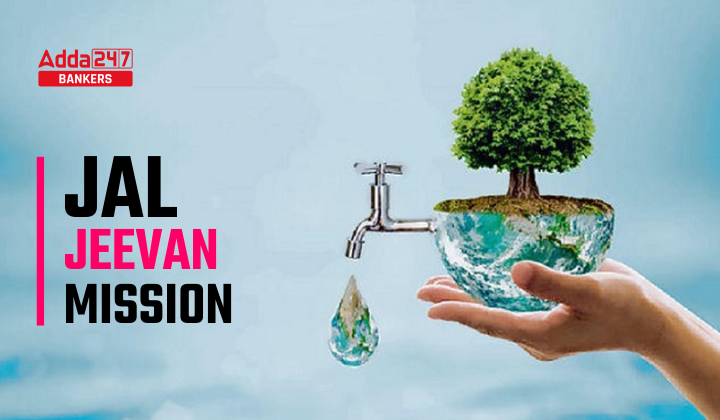Table of Contents
Recent developments :
At the time of the announcement of the Jal Jeevan Mission, 3.23 Crore rural households were reported to have tap water connections. So far, 6.70 Crore households have been provided with tap water connections in the last 35 months. According to the JJM website, out of the targeted 19.15 crore rural homes in India, 10.41 crore, or 54.36 percent, currently have tap water connections.
Gujarat has been declared as a 100 percent ‘Har Ghar Jal’ state. In Gujarat, households in rural areas have access to safe drinking water through taps under the ‘Har Ghar Jal’ mission( 28 october 2022)
Gujarat became the seventh state/Union territory to achieve 100 percent household tap water connectivity under the Jal Jeevan Mission (JJM). Earlier, this milestone had been attained by Haryana, Telangana, and the smaller states/UTs of Goa, Puducherry, the Andaman & Nicobar Islands, Dadra & Nagar Haveli, and Daman & Diu.
Uttar Pradesh ranks at the bottom among states with only 19.41 percent tap water connections. It has managed to provide tap water supply to 51.28 lakh households out of a total of 2.64 crores. In absolute numbers, Bihar (1.6 crores), Maharashtra (1.03 crores), and Gujarat (91.73 lakh) have provided the highest tap water connections under JJM.
Vision of Jal Jeevan Mission
Every rural household has drinking water supply in adequate quantity of prescribed quality on regular and long-term basis at affordable service delivery charges leading to improvement in living standards of rural communities.
Mission of Jal Jeevan Mission
Jal Jeevan Mission is to assist, empower and facilitate:
- States/ UTs in planning of participatory rural water supply strategy for ensuring potable drinking water security on long-term basis to every rural household and public institution, viz. GP building, School, Anganwadi centre, Health centre, wellness centres, etc.
- States/ UTs for creation of water supply infrastructure so that every rural household has Functional Tap Connection (FHTC) by 2024 and water in adequate quantity of prescribed quality is made available on regular basis.
- States/ UTs to plan for their drinking water security
- GPs/ rural communities to plan, implement, manage, own, operate and maintain their own in-village water supply systems
- States/ UTs to develop robust institutions having focus on service delivery and financial sustainability of the sector by promoting utility approach
- Capacity building of the stakeholders and create awareness in community on significance of water for improvement in quality of life
- In making provision and mobilization of financial assistance to States/ UTs for implementation of the mission.
Objectives of Jal Jeevan Mission
The broad objectives of the Mission are:
- To provide FHTC to every rural household.
- To prioritize provision of FHTCs in qualityaffected areas, villages in drought prone and desert areas, Sansad Adarsh Gram Yojana (SAGY) villages, etc.
- To provide functional tap connection to Schools, Anganwadi centres, GP buildings, Health centres, wellness centres and community buildings
- To monitor functionality of tap connections.
- To promote and ensure voluntary ownership among local community by way of contribution in cash, kind and/ or labour and voluntary labour (shramdaan)
- To assist in ensuring sustainability of water supply system, i.e. water source, water supply infrastructure, and funds for regular O&M
- To empower and develop human resource in the sector such that the demands of construction, plumbing, electrical, water quality management, water treatment, catchment protection, O&M, etc. are taken care of in short and long term
- To bring awareness on various aspects and significance of safe drinking water and involvement of stakeholders in manner that make water everyone’s business
Components under JJM
The following components are supported under JJM
Efforts should be made to source funds from different sources/ programmes and convergence is the key
- Development of in-village piped water supply infrastructure to provide tap water connection to every rural household
- Development of reliable drinking water sources and/ or augmentation of existing sources to provide long-term sustainability of water supply system
- Wherever necessary, bulk water transfer, treatment plants and distribution network to cater to every rural household
- Technological interventions for removal of contaminants where water quality is an issue
- Retrofitting of completed and ongoing schemes to provide FHTCs at minimum service level of 55 lpcd;
- Greywater management
- Support activities, i.e. IEC, HRD, training, development of utilities, water quality laboratories, water quality testing & surveillance, R&D, knowledge centre, capacity building of communities, etc.
- Any other unforeseen challenges/ issues emerging due to natural disasters/ calamities which affect the goal of FHTC to every household by 2024, as per guidelines of Ministry of Finance on Flexi Funds
About the Jal Jeevan Mission app:
The Jal Jeevan Mission App has been launched to improve awareness among stakeholders and for greater transparency and accountability of schemes under the Mission. All details about the mission, including how many households received water, quality of water, among other things, will be available in one place on the mobile application.
About the Rashtriya Jal Jeevan Kosh (RJJK):
Rashtriya Jal Jeevan Kosh (RJJK) will enable individuals, institutions, corporations, or philanthropists, either in India or abroad, to contribute/donate to provide tap water connection in every rural household, school, Anganwadi centre, ashram shala, and other public institutions. The RJJK has been launched as a registered public charitable trust, set up by the department of drinking water and sanitation, under the ministry of Jal Shakti.
Other posts
- General Awareness Quiz Series 2022: 28th October
-
Most Important Question Related to Nobel Prize For Bank Exams
- IAF inducts indigenously-developed Light Combat Helicopter ‘Prachand’
| Current Affairs April 2022 | |




 GA Capsule for SBI Clerk Mains 2025, Dow...
GA Capsule for SBI Clerk Mains 2025, Dow...
 The Hindu Review October 2022: Download ...
The Hindu Review October 2022: Download ...
 SSC Calendar 2025 Under Review, Dates So...
SSC Calendar 2025 Under Review, Dates So...





